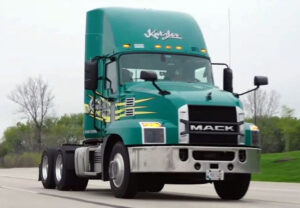WASHINGTON — A Congressional Review Act resolution (CRA) that would overturn the Phase 3 Greenhouse Gas emissions standards for heavy-duty trucks set by the Biden Administration’s Environmental Protection Agency (EPA) was introduced May 1 on Capitol Hill.
The resolution, which was co-authored by U.S. Sens. Pete Ricketts (R-Neb.) and Dan Sullivan (R-Alaska) and U.S. Reps. John James (R-Mich.) and Russ Fulcher (R-Idaho), came a day after an American Trucking Associations’ (ATA) member testified before Congress on the technological, operational and financial challenges fleets face as federal and state regulations mandate the adoption of battery-electric trucks.
During a House Transportation and Infrastructure Subcommittee meeting on April 29, Taki Darakos, fleet manager for PITT OHIO, shared his company’s real-world experience testing battery-electric trucks since 2022.
Darakos explained that high costs, increased weight, prolonged charging periods and minimal driving range limit these vehicles’ utility to the supply chain and create significant barriers to broad deployment.
ATA officials say that while the EPA’s final rule includes lower zero-emission vehicle rates for model years 2027-2029, forced zero-emission vehicle penetration rates in the later years will drive only battery-electric and hydrogen investment, constraining fleets’ choices with early-stage technology that is still unproven.
“The trucking industry needs technology-neutral policies that allow for innovation and alternative fuel sources like renewable diesel, which generates a lower lifecycle carbon footprint than battery-electric vehicles at a fraction of the cost,” according to the ATA.
Todd Spencer, president of the Owner-Operator Independent Drivers Association, has also spoken out against the regulations and is supportive of the Congressional action to reverse it.
“Small business truckers make up 96% of trucking and could be regulated out of existence if the EPA’s misguided mandate comes into effect,” Spencer said. This could have devastating effects on the reliability of America’s supply chain and ultimately on the cost and availability of consumer goods. Local mom and pop trucking businesses would be suffocated by the sheer cost and operational challenges of effectively mandating EV trucks. We thank Senator Ricketts and Senator Sullivan for their leadership in Congress in standing up for America’s small business truckers to fight EPA’s unworkable emissions regulations.”
Over the past several decades, the trucking industry has made strides to cut nitrogen oxide and particulate matter tailpipe emissions by 99%, the ATA contends.
As a result, 60 of today’s trucks emit what just one truck did in 1988, according to the ATA.
“The trucking industry supported EPA’s Phase 1 and Phase 2 greenhouse gas regulations and worked collaboratively with the agency to set aggressive but achievable emission reduction goals on reasonable timelines,” according to the ATA. “EPA’s Phase 3 rule marked a sharp departure from this successful partnership, setting unrealistic adoption rates for battery-electric trucks.”
According to a recent study commissioned by the Clean Freight Coalition, full electrification of the U.S. commercial truck fleet would require nearly $1 trillion in infrastructure investment alone.
The ATA’s opposition to the EPA’s strict guidelines on big rig emissions is hardening.
“The American Trucking Associations opposes EPA’s GHG3 rule in its current form because the post-2030 targets remain entirely unachievable given the current state of zero-emission technology, the lack of charging infrastructure and restrictions on the power grid,” said ATA Chief Advocacy and Public Affairs Officer Ed Gilroy. “Senators Sullivan and Ricketts and Representatives Fulcher and James’ resolution highlights the need for EPA to include the operational realities of trucking in their final regulation.”
Gilroy said the ATA appreciates the members of Congress for drawing attention to the issue.
“(We) look forward to continuing to work with champions in Congress, coalition partners in industry and federal regulators to develop realistic, technology-neutral national emissions standards that will benefit our environment and set our supply chain up for success,” he added.
Born in Pine Bluff, Arkansas, and raised in East Texas, John Worthen returned to his home state to attend college in 1998 and decided to make his life in The Natural State. Worthen is a 20-year veteran of the journalism industry and has covered just about every topic there is. He has a passion for writing and telling stories. He has worked as a beat reporter and bureau chief for a statewide newspaper and as managing editor of a regional newspaper in Arkansas. Additionally, Worthen has been a prolific freelance journalist for two decades, and has been published in several travel magazines and on travel websites.






